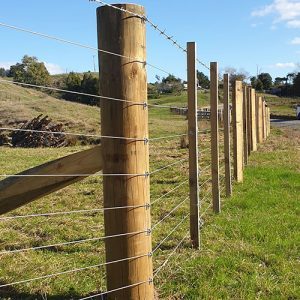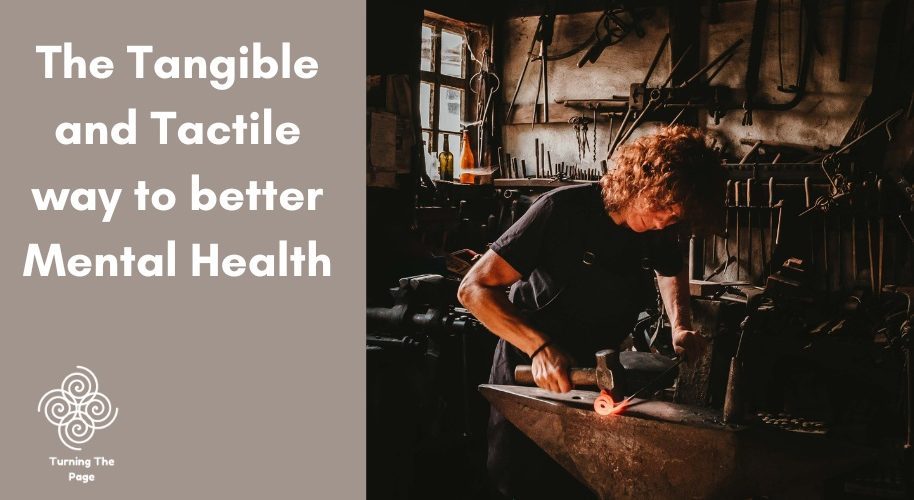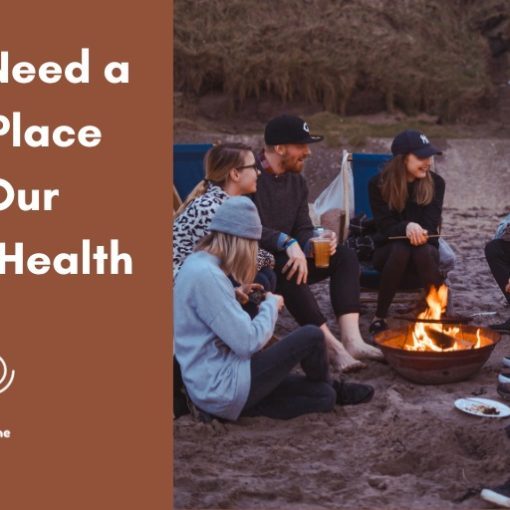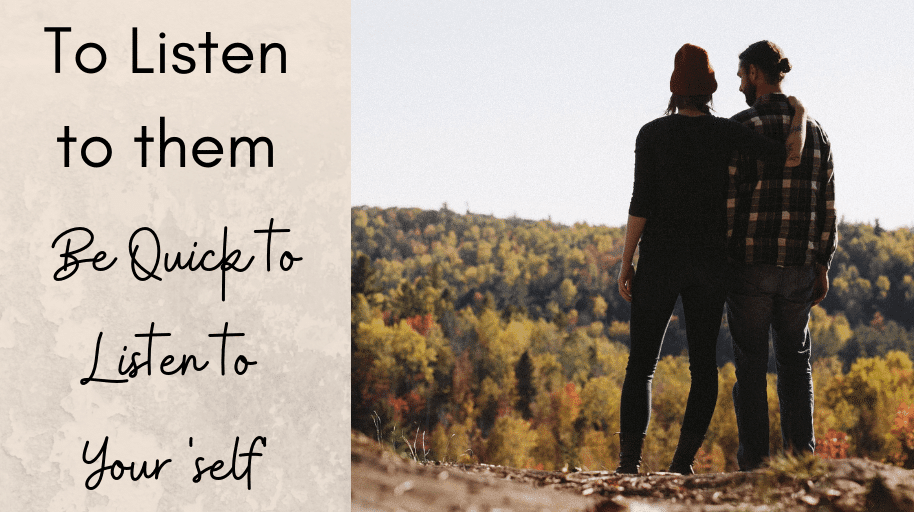Are you out of balance? Perhaps what you need for your mental health are more activities that are tangible and tactile.
In the 1980s, my father and I spent many months building new fences on the farm.
We would clear the old post and wire fence away and make a new fence. First, posts would be driven into the soil, wires run out, stretched tight, and nailed to posts. Then, wooden battens would be fixed to the wires, and we would be done.

But not quite.
Then we would stand by the fence, look at it with wires so tight you could play a tune on it, and admire our work.
Something good here needed to be noted and nourished into our souls. We had created, and it felt good to look at our handiwork.
We improved at the craft every time we built a new fence line.
But the absolute joy came when you would come to that fenceline years later, and it would still be there. Proud and true, you could say with some pride, ‘I built that.’ It was tangible and tactile, not intangible and abstract.
It’s forty-plus years since I built that fence. I don’t know if it’s still there or not. I have moved on, and the salt-borne winds have probably eaten away at the shiny steel to the point it will have needed replacing.
But I often think about that fence because here was an achievement that Father and son accomplished together. I remember pausing for a moment to let it sink into our brains and nourish the good.
Tangible and Tactile
I then think about how much the world has changed since then.
Do people, particularly young people, have those moments of a tangible and tactile activity nourishing the brain with creative hands-on reality? Do they have a grounding with the ground and not the gigabytes?
An observation I have made is that the world has increasingly become more and more digital, intangible, and abstract. People spend hours and hours in front of a screen, and at the end of the day, there is no physical, tangible, or tactile outcome.
I will write this post, probably taking eight hours in full of crafting some megabytes for you, and with a digital ‘click’ on a digital button, it will be published. I couldn’t have done this 40 years ago when I was building that fence.
Instead, it would have been printed on tangible paper with messy tangible ink and distributed via post with hand-to-hand contact.
I often talk with people either on the verge of burnout or fully in it. In their brains, the pendulum of mood has swung into depression and anxiety, and it feels like it has stuck there.
With gentle curiosity, I ask about what they do in their life.
What types of activities fill their days? Tangible or intangible? Tactile or abstract?
Tentmaking and theology
We know very little about his craft and how good he was at it, but we know a lot about his theology and how he talked about God.
Paul, one of the most influential theologians who has shaped the Christian world, had a trade. He was a tentmaker.
After Athens, Paul went to Corinth. That is where he discovered Aquila, a Jew born in Pontus, and his wife, Priscilla.
They had just arrived from Italy, part of the general expulsion of Jews from Rome ordered by Claudius.
Paul moved in with them, and they worked together at their common trade of tentmaking.
But every Sabbath he was at the meeting place, doing his best to convince both Jews and Greeks about Jesus. Acts 18:1-4
I imagine Paul sitting with his friends Aquila and Priscilla in some sunny Corinthian courtyard with needles in hand, creating a tent for a customer. Conversations would ensue about the price of leather, which makes the best needles, how they learned their trade, little techniques shared, and that first tent that Paul made.
Perhaps the conversation would weave its way into talking about some aspect of faith. But at the end of the day, they could look at the physical tent they were making and have a sense of satisfaction and accomplishment.
Jesus, being the son of a carpenter, may well have spent time whittling at a piece of wood while on the road. Perhaps he had to fix a certain roof after some enthusiastic followers pulled it apart.
He certainly drew his teaching stories from the tangible and tactile of soil and seed, wind and rain, and the simple and known grounded reality of daily lives.
The balance is always unbalanced.
Have you noticed that the tightrope walker is always out of balance?
There’s always an auto-correction, even if it’s microscopically tiny. I think much of the world is out of balance. It’s tipped over into the intangible and abstract.
We desperately need more gardeners, tentmakers, woodworkers, chefs, painters, dressmakers, potters, card makers, and bookbinders.
On the other hand, those of us who spend our days in the garden or the workshop need time with the abstract and intangible.
As a gardener, I spend my days with dirt, wind, rain, and flowers. Awesome. But I also need time with a good book or five. To discover and explore the intangible world of ideas and theology, and soul.
Burnout from the drain
It’s the helping professions that concern me the most.
Those are people who spend much of their time with people in need.
Caregivers of the elderly, sick, and disabled. Counselors, spiritual directors, pastors, doctors, nurses, social workers, teachers, etc. It could be the parent of children. Maybe the daughter or son is caring for their elderly parent.
It might be one spouse caring for the needs of the one they love.
It can feel like a constant giving out to the empty cups of others.
Energy is being given out to the abstract and intangible.
You look at your day’s expression and wonder if it has made any difference at all, and you know that tomorrow will be much of the same and the next day too.
Despair is when you fall under the belief and conviction that tomorrow will simply be a repeat of today. Rob Bell
What could be the tangible and tactile gift that you need to balance your life with? Is there a hobby you could dive into? A tiny little gift to yourself at the end of the day.
Something that, at the end of the day, you can look upon and say, ‘I made that.’
Quotes to consider
- Despair is what happens when there is a lack of new creation. When things are just are what they are and there is a deep sense of impotence that there is nothing you can do about it. Rob Bell
- Boredom, cynicism, and despair are spiritual diseases because they disconnect us from the most primal truth about ourselves – that we are here. Rob Bell
- If you have a garden in your library, everything will be complete. – Marcus Tullius Cicero
- A garden is a grand teacher. It teaches patience and careful watchfulness; it teaches industry and thrift; above all it teaches entire trust. Gertrude Jekyll
- Gardens are not made by singing ‘Oh, how beautiful,’ and sitting in the shade. –Rudyard Kipling
- Knitting is very conducive to thought. It is nice to knit a while, put down the needles, write a while, then take up the sock again. Dorothy Day
- You will find something more in woods than in books. Trees and stones will teach you that which you can never learn from masters. Saint Berna
- He who works with his hands is a laborer. He who works with his hands and his head is a craftsman. He who works with his hands and his head and his heart is an artist. St. Francis of Assissi
Questions to consider
- Do you spend most of your time in the Tangible or the intangible, the tactile or the abstract?
- What are some balancing activities for you?
- What nourishes the cup of your life?
Further reading
Barry Pearman
Photo by Malcolm Lightbody on Unsplash





